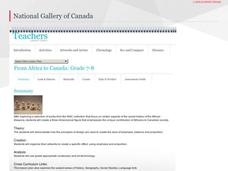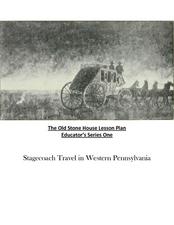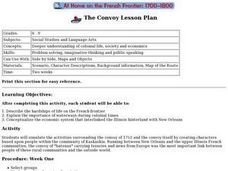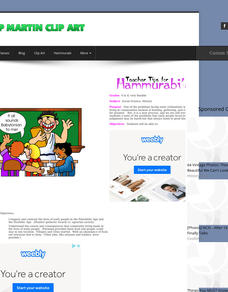Earth Day Network
Conserving Water Through Art!
Having fresh, clean drinking water is a privilege many people take for granted. Help raise awareness about the scarcity of water and the importance of conservation by discussing different ways water is used in everyday life. Brainstorm...
National Gallery of Canada
From Africa to Canada
Represent the African diaspora with figurines. Using a discussion on the contributions of people of African descent as inspiration, class members prepare sketches of a figure and put together a small sculpture from those sketches.
Practical Money Skills
Saving and Investing
Learn the difference between saving money and investing money, as well as the advantages and disadvantages of each. Kids review banking and personal finance terms before studying the different ways that people can reach their financial...
Museum of Tolerance
Can It Happen in America?: Taking Social Action
Class members investigate the Jim Crow Laws, Executive Order 9066, the Chinese Exclusion Act, and the Indian Removal Act to gather information about not only the challenges encountered by diverse groups of Americans, but their...
American Chemical Society
Does Temperature Affect Dissolving?
When making sweet tea, why do people dissolve the sugar in hot tea instead of cold tea? The class discusses the previous lab and builds upon it. Working in groups, they design an experiment to determine how temperature affects the...
Deliberating in a Democracy
Marriage and the State
What defines marriage in society? Scholars investigate the moral and legal arguments of what defines marriage. They analyze different marriage traditions and social customs around the world along with Supreme Court decisions. Individuals...
Folger Shakespeare Library
Essential Everyday Bravery
Shakespeare's plays may be old, but they still have relevant lessons for today's world! A collection of lesson plans uses examples from The Merchant of Venice and District Merchants to teach about bravery. In addition to learning...
Facebook
Different Perspectives
What do people's social media profiles say about them? Explore diverse perspectives and digital citizenship in an activity designed with self-identity in mind. Pupils reflect on their own profiles, then collaborate to examine...
Missouri Department of Elementary
What Are Bullying And Harassment? Part 1
A brief survey begins a lesson that challenges scholars to answer the question, What is bullying? Learners discuss their answers and take notes, paying close attention to the types of bullying and roles people play. Pupils change their...
Center for History Education
Women's Rights in the American Century
Today, many young people find it hard to understand why it took over 150 years for women in the United States to get the right to vote—why there was even a need for the suffrage movement. As they read a series of primary source...
Curated OER
My Feelings
First graders examine and discuss different emotions and feelings, and how people can react when they are in an unsafe situation. They discuss a feelings thermometer, and complete a worksheet involving identifying how they feel in...
K12 Reader
Storytelling and Folklore
Stories are passed down orally in many cultures. Learn about the ways that storytelling can shape a society with a reading passage about Native American folklore and myths. After they finish reading, kids complete five reading...
Curated OER
Old Stone House Lesson Plan
From stagecoach to railroad tracks, your class will discover how advancements in travel in the United States during the nineteenth century played an integral role in the industrialization and development of American society. The main...
Humanities Texas
Primary Source Worksheet: Lyndon B. Johnson, Excerpt from “The American Promise”
"I want to be the president who educated young people to the wonders of their world." Readers examine the vision Lyndon B. Johnson presented for his presidency in this excerpt from his "The American promise" message delivered to Congress...
Wish for the Future
Wish for the Future
What would be your class's ideal world 30 years in the future? What about 100 years? Use a series of activities to discuss globalization, sustainability, scientific contributions to society, and the global community of which your...
J. Paul Getty Trust
Tag: Whose Values
Get young people thinking about their lives and current topics of social justice, advocacy, gender, race, and identity. After examining several works by Barbara Kruger, participants select a tag with one of the questions printed on it,...
Curated OER
Types of Groups
Middle schoolers are introduced to the various types of groups in a society. In groups, they create a chart showing the similarities and differences between primary, secondary, and reference groups. Using magazines, they cut out...
Curated OER
Comparing Cities
Students research the characteristics of cities in two different geographical areas. Using the internet, they take notes on the information they collect and record their observations on the two cities. They discover how the location...
Curated OER
Social Problems -- Lesson 2
Students in an adult ESL class continue to examine the problems faced by those who live in Africa. In groups, they read an article on the internet and analyze how the people in the country are taking care of the problem of AIDS. They...
Curated OER
Hammurabi's Code of Laws
Students explore why the need arose for laws to govern society, comparing and contrasting hunter/gatherer societies vs. agrarian societies. They write letters to the editor of the Babylonian Times, discussing their opinion of Hammurabi's...
Curated OER
The Sociological Point of View
For this sociology and society worksheet, students respond to 4 short answer questions and match 15 sociology terms on the left to the description on the right.
Curated OER
Metis- Grade 12
Twelfth graders explore the settlement of the Canadian Northwest. In this Canadian history lesson, 12th graders research the Metis, the Canadian, Euro-Canadians, Ontario Society, and Quebec Society. Students present their research...
Curated OER
Create Your Own Utopia
Students identify and examine the history of Utopian societies of the 19th century. They analyze the novel "The Giver" to determine whether this is a fair society or not. Students also examine the differences between Jonas' society and...
Other popular searches
- People and Society Geography
- People and Society Europe
- People and Society Primary
- People and Society China
- People and Society n.c.
- Austria's People and Society
- People and Society Australia
- People and Society Nc























